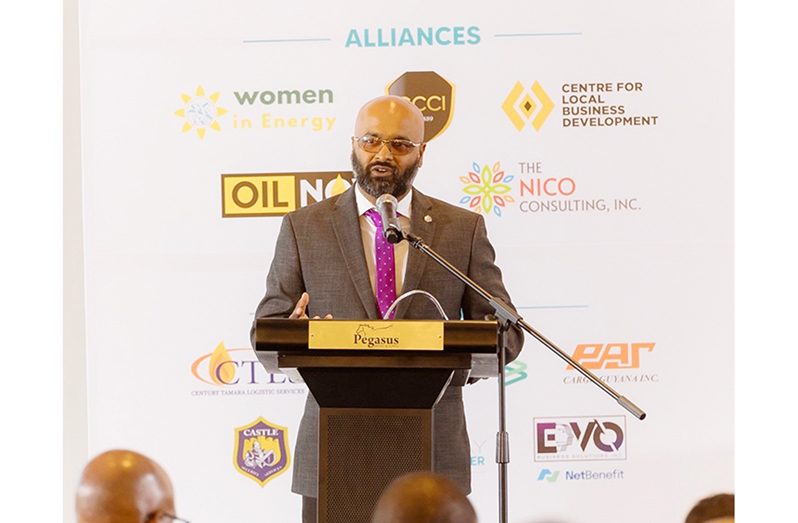By Feona Morrison
IN a call to action, Omkaar Sharma, the Chief Executive Officer (CEO) of Amaya Milk Company, has implored the Guyanese diaspora to consider returning home and actively investing in the advancing agricultural sector.
In an interview with Kiana Wilburg, CEO of the Guyana Energy Conference and Supply Chain Expo, Sharma emphasised the significant impact the diaspora can have on transforming Guyana’s agricultural sector and ensuring its economic sustainability. Following a stay of almost twenty years in Canada, Sharma returned to Guyana and made a substantial investment of $150 million in an expansive dairy farm located in Onverwagt, West Coast Berbice (WCB). This farm has the capacity to produce 600 gallons of milk on a daily basis.
The farm is known for producing fresh cow milk of exceptional quality, which is pasteurized and packaged in glass bottles.
He stated that the government is actively promoting investment in the agricultural sector through a series of initiatives.
“For anybody in the diaspora that is looking to come back and invest in agriculture, there is not a better time to do it. Do it! There are many areas of opportunities that are available and we just need people to come in and fill those areas,” Sharma said.
Although confronted with obstacles in establishing his business, the entrepreneur underscored that these challenges are comparable to those encountered globally, even in developed nations. Within this context, he provided advice emphasising the importance of “patience and perseverance.” Sharma stated that a major reason for his return home is to assist the region in achieving the goal of reducing its substantial food importation bill by 25 per cent by the year 2025. He disclosed that Guyana allocates an annual budget ranging from US$25 million to US$30 million for the importation of dairy products. “If we can cut back that amount…think about what that does for our country,” he reasoned.
Despite his contentment with the current production, Sharma disclosed that Amaya Milk Company is only utilising approximately 20 percent of its plant capacity. “There is a lot of room for us to grow. There are a lot of new products that we are looking at. There is still a lot more than we are looking to do. There will be a little bit of time for us to get there and I’m not bothered by that.”
He further added that this will present significant opportunities for farmers. The Amaya Milk Company is strategically situated in Region Five (Mahaica-Berbice), which happens to be the largest cattle-producing region in the country.
While emphasising that fresh pasteurized cow milk is the “best and healthiest” form of milk, he explained why the product is packaged in glass bottles.
He believes plastic should never be used for food packaging because it “breaks down and leaches into our food,” posing risks to both human health and the environment.
Sharma said: “I really feel strongly about moving away from plastic as a packaging material for food. Glass is the best alternative. First off, there is no leaching. There is no opportunity for anything to get into our food. But also, we can recycle that. We take that [the bottles] back.”
Additionally, he expounded upon his viewpoints regarding the utilisation of technology for the purpose of augmenting the dairy industry. He said that his company is striving to establish an organised dairy sector, which is currently lacking in Guyana. He mentioned that Amaya Milk Company continues to employ hand milking, contrasting with the global trend of robotic milking. However, Sharma is confident that Guyana will get there and can draw on lessons from other countries for guidance throughout the process.
Amaya Milk Company produces milk as well as paneer—a non-aged, non-melting soft cheese made by curdling milk with a fruit- or vegetable-derived acid, such as lemon juice.
By streamlining regulatory processes and providing technical assistance, the government is creating a more conducive environment for both local and diaspora investors to thrive in the agricultural sector. The goals of this all-encompassing assistance are to increase food security, increase production, and lessen the reliance of the nation and Caribbean region on imported food items.



.jpg)








